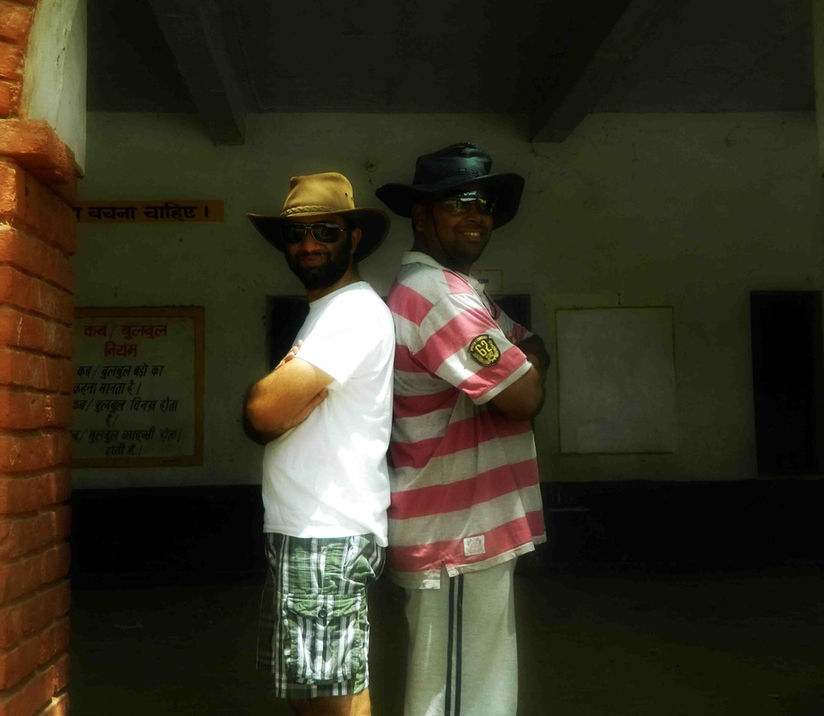
Round Squaer Service Project
The main focus on this years’ Project would be on:
a. Revisiting and annual maintenance of the Patauda site – originally taken up in Phase I.
b.Adding a stage/platform & girls toilets for performance to the government village school in Village Teekli.
c. Undertaking de-silting of a new pond area which has been in disuse for a decade.
Overview
Phase – III of the Collaborative Service Project began with the arrival of the participants on the morning of the 10th of June. The sun was scorching, the heat unforgiving and as the group assembled on the basketball courts – for an ‘ice-breaker’ (irony unintended!) – foregoing the confines of the air conditioned rooms seemed like a major sacrifice!Ten days later, the intensity of the heat had not lessened any, the fury of the dust storms was as much a living fact and yet the students happily danced to the tunes of the village folk music and made the most of this unique bond between ‘Bharat’ and ‘India’ that they had managed to forge so very effortlessly.
It was centered on the IDEALS of Round Square and not only encouraged Service but also Environmental Protection and promoted leadership traits. Round Square is a worldwide association of more than 90 schools which share a commitment beyond academic excellence, to personal development and responsibility.
The Project worked on two different yet connected aspects. One was revisiting and de-silting the water body called Patauda. This water body is a common one for people of three neighbouring villages who bring their cattle to graze in the adjoining lands. This pond was so rundown and dilapidated that water was being bought from Gurgaon – in tankers and pumped into the lake! Pathways World School took up the initiative of rejuvenating the lake and was ably partnered by Welham Boys School, Vidya Devi Jindal School for Girls and in the last two years has had almost 90 students from The Doon School, St.
George’s School, Switzerland, The Sanskaar Valley School, Indus International School, Hyderabad, amongst other participants. Today, this lake holds water for almost 10 months in a year. This water body has a few channels from which water flows in and we did the manual and arduous task of cleaning these for rain water to flow towards the lake.
The second task was a construction project at Government Senior Secondary School, Tikli. The pivotal school in the village of Tikli, the Senior Secondary school has been running since 1968. It gets students from three villages: Tikli, Baas and Aklimpur and has a student base of about eleven hundred students with a minimal population of girls purely driven by the absence of girls toilets.
With a strong belief of learning by doing and commitment beyond academic excellence, a group of more than a dozen motivated students undertook the task of demolishing part of the existent toilets and renovating them. This involved raising the level of the passage leading to these washrooms to avoid water clogging in the monsoons with the rain rendering them defunct, rebuilding the roof of the raised washrooms, installing doors and other fitments and also refurbishing the school building.
The children also got an opportunity to acquire a new skill by taking up two different projects in Design & Technology besides exploring sports facilities and swimming in the daytime.The experience has contributed to the on-going process of individual development of every student into a committed young adult in the community.
NATURE OF WORK – PROJECT PATAUDAT
The locally known ‘Patoda’ (in local language, to denote a Waterhole) is a frequented location where buffaloes and cows from the vicinity come to graze and sit in the swamp/low lying water that collects there. Over the years, the catchment to this waterhole have been blocked, due to commercial use of surrounding land area, and the silting of the area itself has made the place shallow, thereby depleting the water, much earlier than in the past.
The Project would involve de-silting the area of the pond and if possible, clearing up the channels that bring rain water to this lake, from the catchment areas.


























